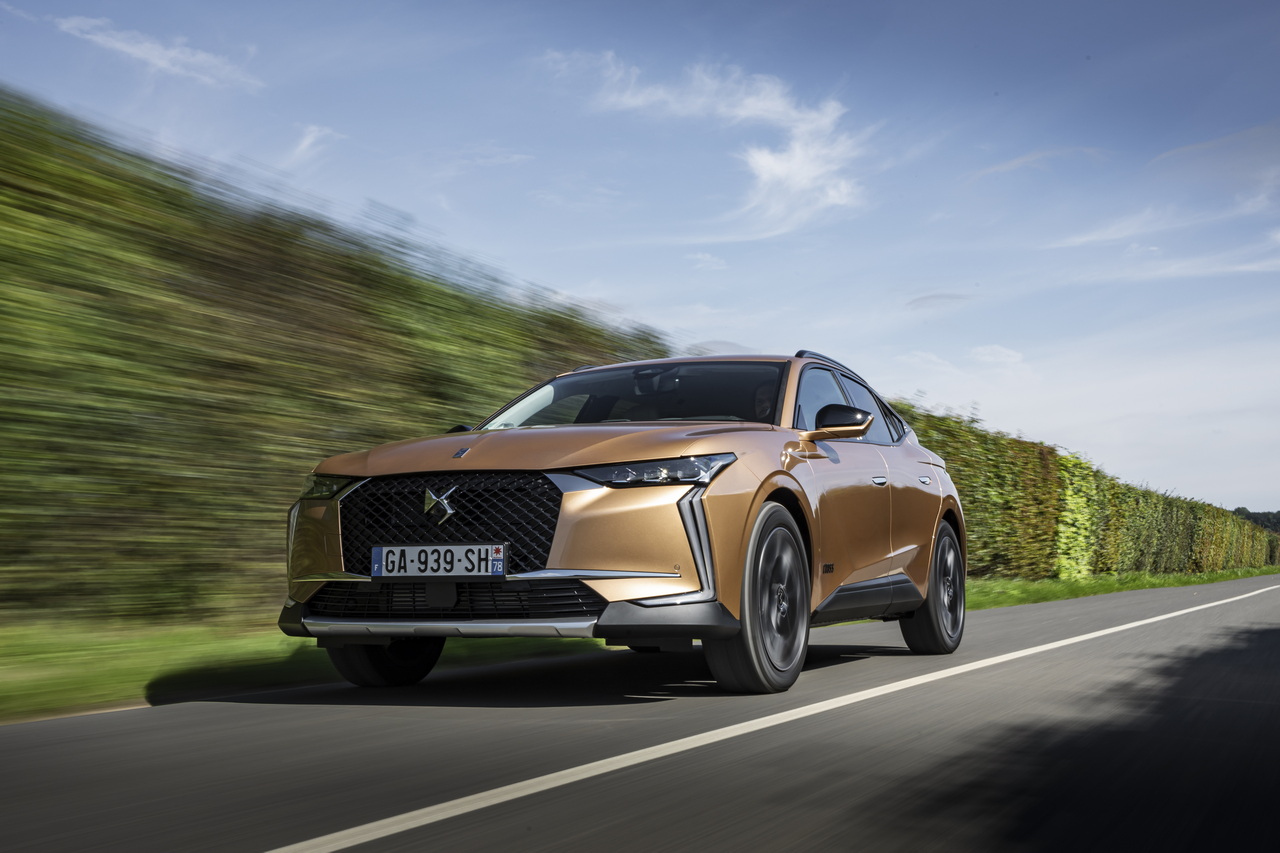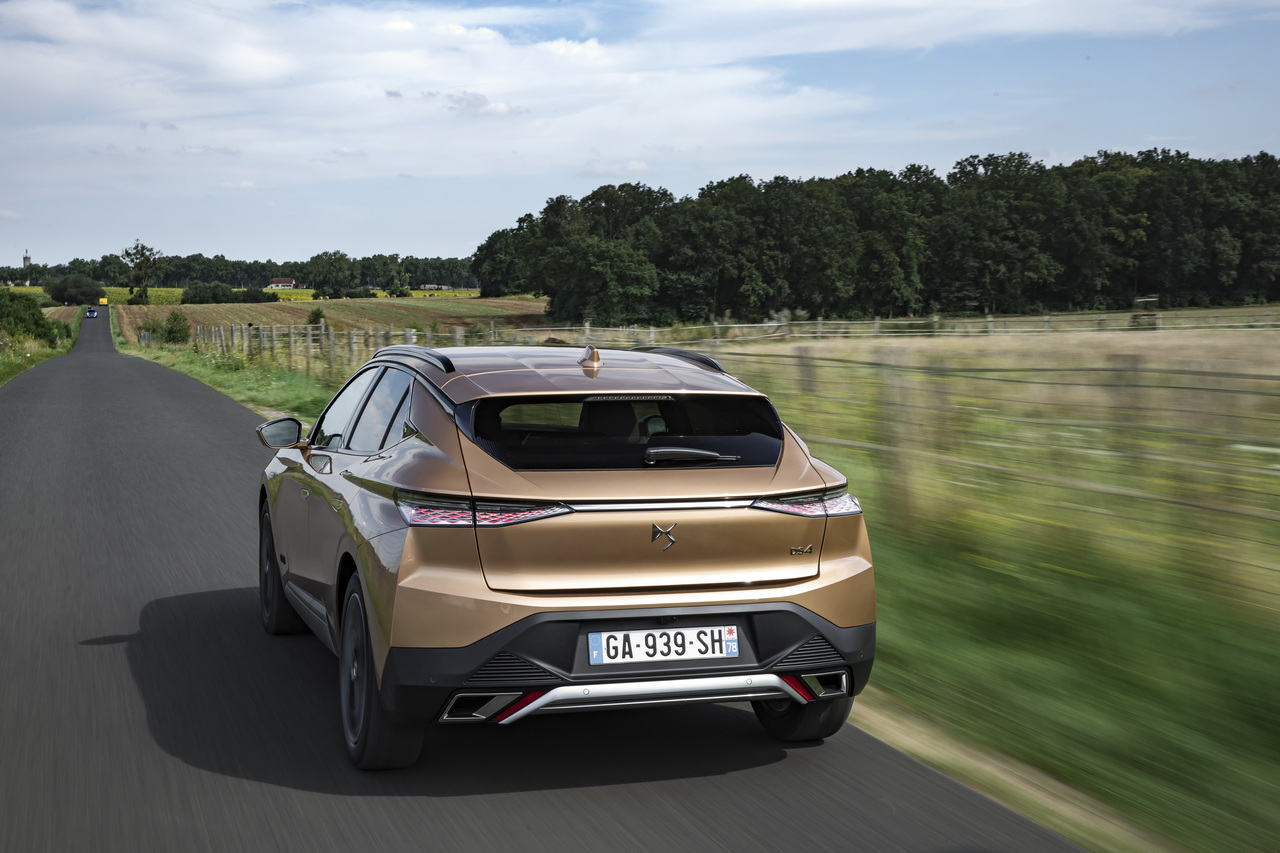
With its rechargeable hybrid engine of 225 cumulative hp, the new DS4 E-Tense promises 55 km of autonomy in electric mode and a fuel consumption of 1.3 l per 100 km in the combined cycle. Two values quite far from those recorded during our tests in town, on the road and on the motorway…
Car tested: DS DS 4 E-Tense 225
|
From€38,800
€1,000 bonus
|
On paper, plug-in hybrid technology combines the best of both worlds. On a daily basis, its electric motor connected to a large battery ensures journeys of 40 to 50 km in silence, after recharging for around seven hours on a standard household socket. Its “good old” petrol block then takes over and boasts much higher performance, autonomy and ease of refueling (no headaches finding a charging station on a long journey).
This versatility unfortunately weighs heavily in the balance, very real first (electric motor and battery generate an overweight of about 300 kg), then budgetary. At a minimum of €38,800 before bonuses, the new DS4 E-Tense 225 starts at €6,700 more expensive than a BlueHDi 130 version which once attracted professional buyers. The additional cost appears to be lower among demanding individuals: €2,600 more expensive than a DS4 PureTech 225 in face price, the DS4 E-Tense 225 comes to almost the same price including its €1,000 bonus (only valid until the 30 June 2022) and the petrol penalty (between €900 and €1,500 in 2022).

Our DS4 Hybrid test was finished in Cross Rivoli (€48,100) adorned with pretty optional 20-inch wheels (€1,000). In this configuration, it is homologated at exactly 1.4 l/100 km and 53 km of autonomy, against 1.3 l and 55 km in the Bastille + basic finish with 19 ” wheels that consume less energy. Remember, however, that our Cross version retains the same ground clearance as the classic DS 4, and differs from it just in a few decorative elements and a pair of streamlined roof rails.
For this consumption test in real conditions, we first carried out our usual electric autonomy course with a 100% charged battery. Then, and since it is illusory to stick to the use of each driver (charging possibilities, length of daily journeys, type of route taken, etc.), we recorded the fuel consumption in town, on the road and on the highway with a low battery, to facilitate comparisons and then calculations according to personal use.
DS4 plug-in hybrid: what electric range?
On our test route combining expressways at 110 km/h, secondary roads at 80 km/h and crossings of fluid villages, the DS4 hybrid woke up its combustion engine after 40 km all round. A rather disappointing score because it is lower than that of the Citroën C5 Aircross Hybrid 225 SUV (45 km) yet higher, heavier, and equipped with a battery of barely greater capacity (10.8 useful kWh instead of 10 here). This will suffice on most daily journeys, provided you can recharge regularly: count 7 hours on a classic domestic socket, 3 h 50 on a reinforced 3.7 kW socket, and 1 h 45 min on a public terminal or Wallbox 7.2 kW… whose installation does not seem essential (a “slow” charge takes less than one night at home).
During our test, several journeys in town at a temperature of 0°C showed us how much the heating of the passenger compartment had an impact on autonomy, down 30% compared to the same journey made at 15°C! To limit the phenomenon, warming up the passenger compartment during recharging is ideal. Its programming is possible from the on-board computer, and theoretically via the remote control mobile application, but the latter never wanted to work during our tests. To correct.
What fuel consumption on the road?

With its soft steering, its effective soundproofing and its plush piloted suspension, the DS4 E-Tense 225 does not particularly invite dynamic driving. It is certainly efficient in a straight line (efficient restarts when its two motors join hands, even low battery), still efficient in turns despite its overweight (on wet roads too, at least with the Goodyear Eagle F1 tires of our DS4 from test), but clearly does not have the soul of a sporty compact: not very direct steering, spongy brake pedal, no real manual mode of the auto box despite the paddles on the steering wheel. Therefore, we adopt a flowing rhythm profitable to consumption, without familiarity with records of sobriety: 7.2 liters per 100 km on a sometimes tortuous path. Not sure a gasoline version would have done worse.
What fuel consumption on the highway?
To the effective comfort and soundproofing identified on the road, the DS4 adds the relevance of its semi-autonomous driving system on the motorway. Different from the annoying stock Lane Departure Alert (and its nasty steering feedback when approaching a turn), this more advanced feature keeps the car in a desired position in its lane and manages distance with the preceding user. But at a stabilized 130 km/h, consumption still does not shine: 8.0 liters per 100 km, or half a liter of… more than a DS4 PureTech 225 100% thermal. On a long journey, the hybrid version also suffers from a 12-litre amputated tank, and a fanciful autonomy which requires a stop after barely 30 liters consumed. Constraining on a long stage, even disqualifying for drivers accustomed to driving beyond 130 km/h (on the German motorway, for example).
What consumption in town?

Any on extra-urban route, the consumption of the DS4 E-Tense should this time shine in town. Even low battery, the car works like a classic hybrid model and evolves in electric mode up to around 20-25 km/h after having stored the kinetic energy during deceleration. Again, however, we were unable to descend below the 8.5 liters per 100 km on a fluid urban route of 38 km, and even curled the 10 l on short journeys: after the cold start, the 1.6 PureTech turns at 1,400 rpm instead of 750 rpm to briefly regenerate the battery. A disappointing result that we also observed with the Peugeot 308 Hybrid in town. On the pleasure side, the optional 20-inch wheels of the DS4 generate some jolts on the deep manholes approached at low speed, while the transition between regenerative braking (to recharge the batteries) and by friction (via the discs and pads) systematically amplifies the deceleration before stopping. Annoying.
Find the results of the test, the technical sheet and all the prices and equipment of the DS4 E-Tense 225 on the next page…

















